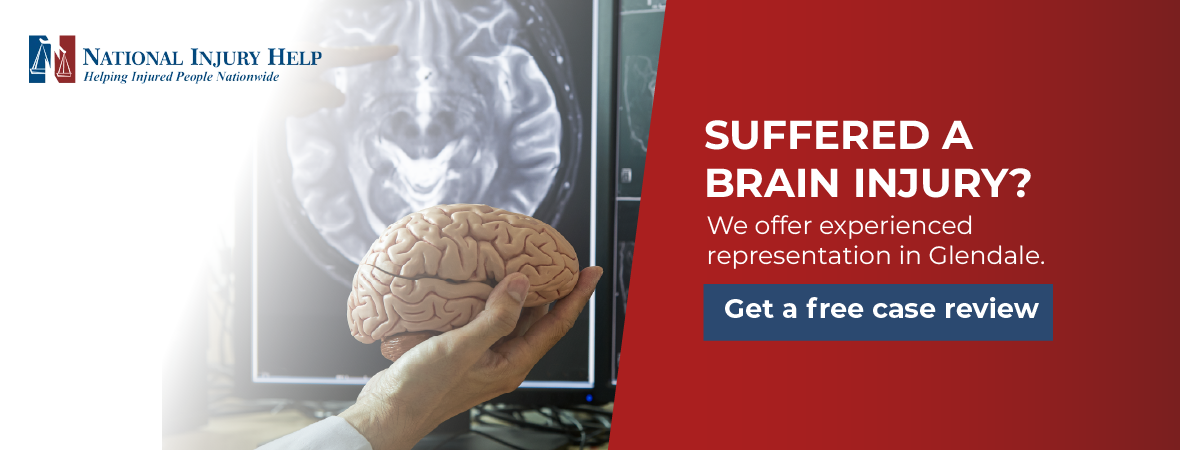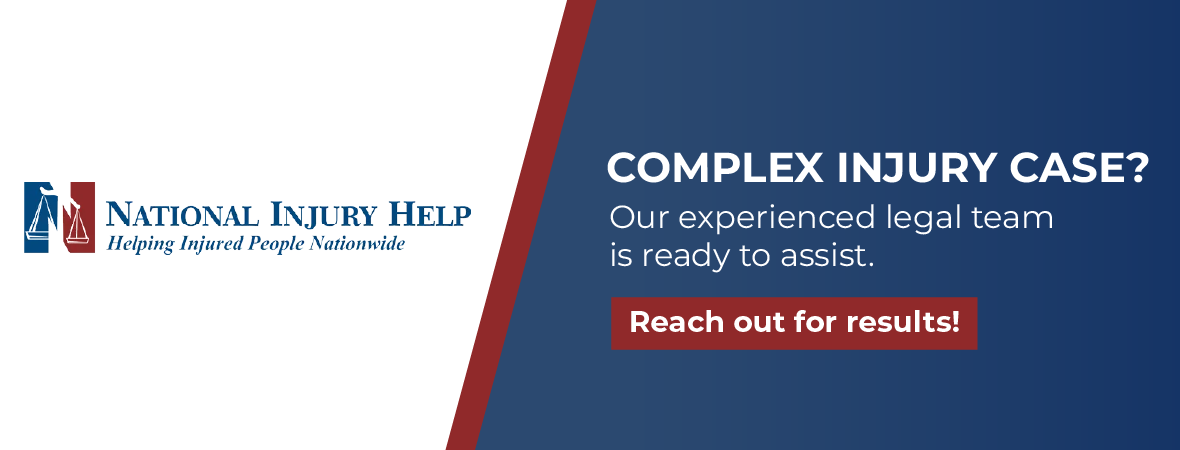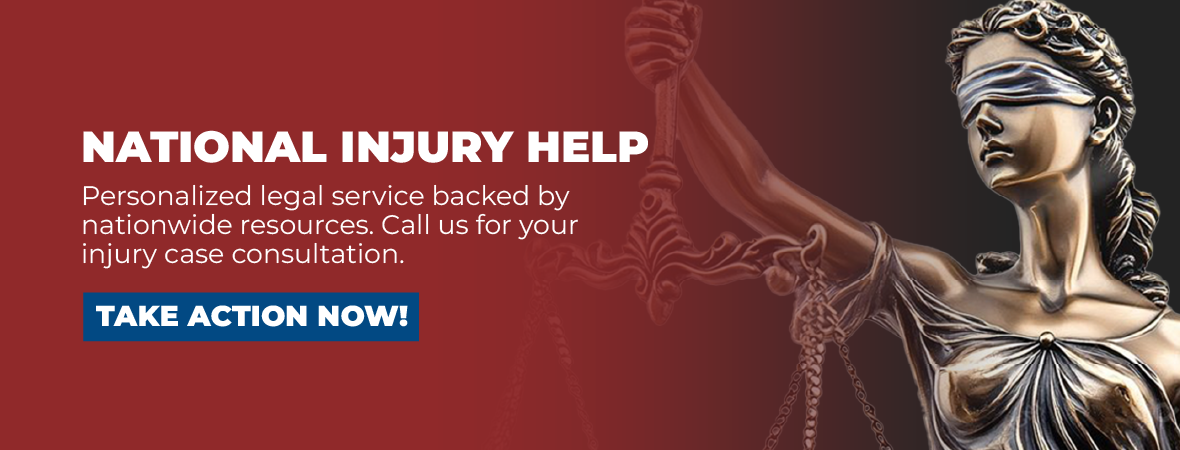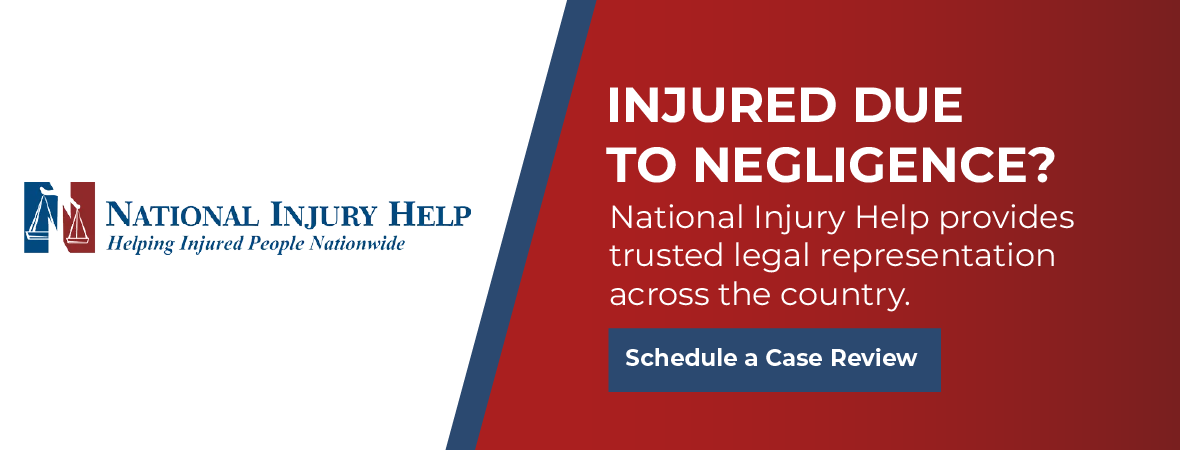We know how overwhelming a brain injury can be, but you don’t have to navigate recovery and legal action on your own. Contact National Injury Help today by calling 1 (800) 214-1010 and let us shoulder the legal burden so you can focus on healing and reclaiming control of your future.
When someone suffers a traumatic brain injury, the damage can be life-altering, physically, emotionally, and financially. Whether caused by a car crash on Grand Avenue, a fall at a busy retail center like Arrowhead Towne Center, or a violent collision on Loop 101, head injuries demand immediate medical care and long-term legal support.
If you or a loved one is living with the effects of a serious head injury, it’s time to speak with a dedicated Glendale brain injury attorney who understands the complexities of your case.
Our legal team operates under Arizona’s Alternative Business Structure model, which allows for more efficient, modern, and collaborative legal services. By combining traditional legal advocacy with innovative business management, we deliver results with speed and precision, whether your case is in Glendale or anywhere in the U.S. Through strong co-counsel relationships, we provide nationwide reach, with deep roots in Arizona.
Decades of Experience, Local Knowledge, and National Resources
With over 40 years of combined legal experience in mass tort and personal injury litigation, our attorneys are seasoned in fighting for victims of complex injuries like TBI. We know that head trauma cases often involve invisible symptoms, long-term care needs, and insurance companies that try to minimize payouts.
We Help Victims of Brain Injuries Caused By:
- Auto accidents near Westgate Entertainment District and I-17
- Slip-and-falls in shopping centers, apartment complexes, and hotels
- Sports injuries or workplace accidents involving heavy equipment
If your life has been turned upside down by a serious head injury, don’t settle for a generic legal approach. You need a TBI lawyer in Glendale who understands how to pursue head trauma compensation aggressively and who will treat your case with the urgency and respect it deserves.
Understanding Brain Injuries
A brain injury can change a person’s life in an instant. Unlike visible injuries such as broken bones or bruises, the effects of a brain injury may not be immediately apparent and can continue to evolve over time. Understanding the different types of brain injuries and their consequences is essential when building a strong legal claim with the help of a qualified Glendale brain injury attorney.
What Is a Traumatic Brain Injury?
A traumatic brain injury occurs when an external force causes the brain to move rapidly within the skull, disrupting normal brain function. This force can result from a blow, bump, jolt, or penetrating injury to the head. TBIs are classified by severity: mild, moderate, or severe.
- Mild TBIs, such as concussions, may cause temporary symptoms like headaches, confusion, or dizziness, but still require medical evaluation.
- Moderate to severe TBIs can lead to long-term impairment, coma, or even death. These injuries often involve bleeding in the brain, skull fractures, or prolonged unconsciousness.
Common Causes of Brain Injuries in Glendale
Brain injuries can happen almost anywhere—from everyday activities to serious accidents. In Glendale, some of the most common scenarios include:
- Motor vehicle collisions on Loop 101, Grand Avenue, or Glendale Avenue
- Slip-and-fall incidents at shopping centers, hotels, or apartment complexes
- Bicycle and pedestrian accidents involving inattentive or reckless drivers
- Workplace accidents involving machinery or falls from heights
- Recreational injuries, such as those from youth sports or horseback riding
These accidents often involve negligence, making victims eligible for compensation under Arizona personal injury law.
Symptoms of Brain Injuries
The symptoms of a brain injury vary depending on the location and severity of the damage. Some signs are obvious, while others may appear days or even weeks later. Be on the lookout for:
- Loss of consciousness, even briefly
- Headaches, nausea, or vomiting
- Slurred speech or confusion
- Memory problems or difficulty concentrating
- Mood swings or changes in personality
- Fatigue, insomnia, or sensitivity to light and sound
Children may show different signs, such as irritability, loss of interest in toys, or changes in eating and sleeping habits.
The Hidden Nature of TBIs
One of the biggest challenges with brain injuries is that they are often invisible to the naked eye. Victims may appear “fine” but continue to suffer from debilitating cognitive, emotional, and physical symptoms. This disconnect can make it difficult to get the care and support needed, especially when dealing with skeptical insurance companies.
Why Medical Documentation Matters
Prompt diagnosis and ongoing evaluation from specialists such as neurologists or neuropsychologists are critical for both health and legal reasons. Your TBI lawyer in Glendale will use this documentation to link the injury to the incident, demonstrate its long-term effects, and help pursue maximum head trauma compensation.
Understanding the true scope of a brain injury is the first step toward securing the resources needed for healing and stability.
Symptoms and Long-Term Consequences of Brain Injuries
Traumatic brain injuries can have wide-ranging and often unpredictable effects on a person’s life. While some symptoms appear immediately after the injury, others may take days, weeks, or even months to fully develop. In many cases, the long-term consequences of a brain injury can be more disabling than initially expected.
Understanding both the short-term and lasting impacts is essential, not only for medical treatment but also for building a strong legal claim with the support of an experienced Glendale brain injury attorney.
Short-Term Symptoms After a TBI
Right after a head injury, the brain may respond with symptoms that range from mild to severe. Even if the person did not lose consciousness, they may still have a concussion or other serious damage. Common early symptoms include:
- Headache or pressure in the head
- Nausea or vomiting
- Dizziness or loss of balance
- Confusion or disorientation
- Slurred speech or delayed response
- Fatigue or drowsiness
In some cases, these symptoms resolve within a few days. However, lingering or worsening symptoms may indicate more significant trauma and should be evaluated by a neurologist immediately.
Cognitive and Emotional Impacts
A major concern with TBIs is the damage done to cognitive function. These impairments often interfere with work, education, and everyday life:
- Memory loss or difficulty forming new memories
- Poor concentration and attention span
- Executive dysfunction, making planning or decision-making difficult
- Emotional volatility, including sudden mood swings, depression, or anxiety
Victims often experience frustration, embarrassment, or isolation due to changes in their mental and emotional state. Loved ones may notice shifts in behavior, personality, or responsiveness.
Physical and Sensory Consequences
Brain injuries can also disrupt how the body processes sensations and controls movement. Depending on which part of the brain was affected, patients may develop:
- Sensitivity to light and sound
- Difficulty with coordination or balance
- Persistent headaches or migraines
- Seizures or tremors
- Vision problems or ringing in the ears
These physical challenges may require long-term therapy or lifestyle adjustments. In severe cases, victims may become dependent on caregivers for mobility or daily functions.
Long-Term and Permanent Effects
Not all TBIs heal completely. Many victims, especially those with moderate to severe injuries, face long-term or permanent challenges that affect their independence and quality of life. These may include:
- Inability to return to work or school
- Need for ongoing therapy or home care
- Risk of developing neurodegenerative conditions (e.g., dementia, Parkinson’s-like symptoms)
- Increased vulnerability to future brain injuries
These long-term impacts can place tremendous strain on families, emotionally, physically, and financially.
Why Early Intervention Matters
Identifying symptoms early and pursuing a proper treatment plan can improve outcomes. From a legal perspective, documenting how these symptoms affect your daily life and earning capacity is critical. A knowledgeable TBI lawyer in Glendale can work closely with medical experts to ensure that your head trauma compensation reflects the full extent of your long-term needs.
Common Accidents That Cause Brain Injuries in Glendale
Traumatic brain injuries can result from a wide variety of accidents—many of which occur every day on the roads, sidewalks, job sites, and recreational areas in and around Glendale. Understanding the most frequent causes of TBIs is essential, not only for prevention but also for building a strong legal claim if you or someone you love has been injured.
A qualified Glendale brain injury attorney can help you determine the cause, prove liability, and pursue the compensation you deserve.
Motor Vehicle Accidents
Auto collisions are among the leading causes of TBIs in Glendale and across Arizona. The sudden impact of a crash can cause the brain to strike the inside of the skull, resulting in anything from a mild concussion to a severe closed-head injury. Some of the most common crash types include:
- Rear-end collisions on busy roads like Loop 101 and Glendale Avenue
- T-bone and head-on crashes at intersections such as 59th Avenue and Bell Road
- Rollover accidents on highways like I-17, especially at high speeds
Even if there’s no visible head injury, the force of a collision can still cause internal brain trauma.
Pedestrian and Bicycle Accidents
Glendale is home to many active residents who walk, jog, and bike throughout the city. Unfortunately, these individuals are at high risk of brain injuries when struck by vehicles, particularly in areas with heavy traffic or limited pedestrian infrastructure.
Common danger zones include:
- Crosswalks near Westgate Entertainment District and State Farm Stadium
- School zones and residential neighborhoods with speeding concerns
- Bike lanes with inadequate protection from fast-moving vehicles
TBIs from pedestrian or cyclist accidents often involve direct impact to the head or a secondary injury from striking the pavement.
Slip and Fall Accidents
Falls are a leading cause of brain injuries, especially among the elderly and young children. When someone slips on a wet floor or trips over uneven pavement, they may hit their head during the fall. Brain injuries from falls frequently occur in:
- Grocery stores, retail centers, or malls like Arrowhead Towne Center
- Apartment complexes and public sidewalks
- Construction sites and poorly maintained buildings
In these cases, property owners or managers may be held liable under Arizona premises liability law.
Workplace Accidents
Construction workers, electricians, warehouse employees, and other laborers face a heightened risk of head trauma due to falls from heights, falling objects, or equipment malfunctions. Glendale’s growing commercial and industrial sectors have seen an increase in work-related injuries, including:
- Falls from scaffolding or ladders
- Being struck by tools, equipment, or machinery
- Vehicle-related accidents within work zones
Employers, contractors, or third-party vendors may share responsibility for injuries in these environments.
Recreational and Sports Injuries
Sports-related concussions and recreational accidents are another source of TBIs, particularly in youth athletics. Glendale’s many parks and sports fields see a high volume of contact sports where brain injuries may go unreported or untreated.
No matter how the injury occurs, proving negligence and establishing the full extent of your injuries is key to securing compensation. A skilled TBI lawyer in Glendale can investigate your accident and help you pursue full head trauma compensation for your medical bills, lost wages, and future care.
The Legal Challenges of Brain Injury Cases
Brain injury cases are among the most complex and contested types of personal injury claims. Unlike visible injuries such as broken bones or burns, a traumatic brain injury is often “invisible” and difficult to fully diagnose or measure, yet it can have devastating and lifelong effects.
Successfully pursuing compensation requires not only strong medical evidence but also a deep understanding of how brain trauma impacts every aspect of a person’s life. That’s why working with an experienced Glendale brain injury attorney is so important.
Invisible Injuries, Real Consequences
One of the biggest legal hurdles in a brain injury case is proving the extent of the damage. TBIs, especially concussions and closed-head injuries, may not appear on standard imaging tests like X-rays or CT scans. Victims might look physically fine while suffering from debilitating symptoms such as:
- Memory loss and cognitive dysfunction
- Sensitivity to light and sound
- Mood swings, depression, or anxiety
- Chronic headaches or dizziness
Because the effects are not always externally visible, defense attorneys and insurance adjusters often attempt to minimize the injury or claim the symptoms are psychological or unrelated to the accident.
Proving Causation and Damages
Another common challenge is proving that the brain injury was directly caused by the incident in question, especially if the victim had a prior head injury, neurological condition, or delay in seeking treatment.
Successfully overcoming this obstacle often requires:
- Testimony from neurologists, neuropsychologists, and medical experts
- Neurocognitive testing that documents the full scope of impairment
- Evidence from friends, family, or employers about personality changes or reduced functioning
This type of evidence takes time, money, and legal expertise to gather, analyze, and present in a compelling way, especially if the case goes to trial.
Fighting the Insurance Companies
Insurance companies often try to reduce payouts in brain injury cases by claiming:
- The injury was mild and should have resolved on its own
- The symptoms are exaggerated or unrelated to the accident
- The victim is able to return to work or resume normal life
Even when liability is clear, insurers may offer settlements that don’t begin to cover the cost of long-term medical care, future lost wages or emotional trauma. Victims without strong legal representation may feel pressured to accept these low offers simply to pay their bills.
High-Stakes and High-Cost Litigation
Brain injury cases often require significant resources to litigate. This includes retaining medical experts, vocational analysts, life care planners, and economists who can help quantify the long-term costs of the injury. The legal team must also prepare for aggressive defense tactics, such as surveillance, social media monitoring, and invasive depositions.
Working with a TBI lawyer in Glendale who understands these tactics, and has the resources to fight back, is essential for securing full and fair head trauma compensation.
Brain injuries are legally challenging, but with the right attorney, victims can navigate these complexities and hold negligent parties accountable. Don’t face these obstacles alone, get legal support from a firm that understands both the science and the strategy needed to win.
How a Glendale Brain Injury Attorney Can Help
Brain injuries are uniquely complex, both medically and legally. Unlike cuts or broken bones, traumatic brain injuries often involve invisible symptoms, long-term treatment needs, and emotional or cognitive changes that disrupt every part of a victim’s life.
A knowledgeable Glendale brain injury attorney can be your advocate, helping you navigate this challenging landscape while fighting for the full compensation you deserve.
From the moment you hire a lawyer, you gain a powerful ally who understands how insurance companies operate and how to build a compelling case that supports your recovery.
Brain injury claims often require extensive medical evidence, expert testimony, and detailed documentation of how your injury affects your daily life, earning ability, and future independence. Your attorney will coordinate with neurologists, neuropsychologists, and life care planners to present a complete picture of your damages.
Here’s how a dedicated TBI lawyer in Glendale can support your claim:
- Investigate the cause of your accident and identify all responsible parties
- Work with medical experts to validate the injury and its long-term effects
- Negotiate assertively with insurance companies to avoid lowball offers
- Litigate aggressively if a fair settlement cannot be reached
Whether your head trauma was caused by a crash on Loop 101, a fall at a Glendale business, or a sports injury, you deserve compensation that reflects the true toll of your injury. An experienced attorney will ensure you aren’t overlooked or underestimated and will fight to protect your financial and physical future every step of the way.
Compensation Available in Brain Injury Cases
Victims of traumatic brain injuries may be entitled to a range of damages to help cover the life-altering effects of their condition. Whether the injury was caused by a car crash, fall, or other preventable accident in Glendale, Arizona law allows victims to seek both economic and non-economic compensation through a personal injury claim.
Economic Damages
These are measurable financial losses related to the injury, including:
- Medical expenses (past and future)
- Rehabilitation and therapy costs
- Lost wages and diminished earning capacity
- In-home care and assistive devices
Brain injuries often lead to years of treatment and may prevent victims from returning to their jobs. Your Glendale brain injury attorney will work to calculate these losses accurately.
Non-Economic Damages
These reflect the emotional and personal toll of a brain injury:
- Pain and suffering
- Mental anguish and emotional distress
- Loss of enjoyment of life
- Cognitive impairment or personality changes
In some cases, punitive damages may also be awarded if the at-fault party acted with extreme negligence or misconduct. With the help of a skilled TBI lawyer in Glendale, you can pursue full and fair head trauma compensation that accounts for both visible and invisible injuries.
Filing Deadlines and Arizona Statute of Limitations
If you’ve suffered a brain injury in Glendale due to someone else’s negligence, time is not on your side. Under Arizona law, there is a strict statute of limitations that limits how long you have to file a personal injury lawsuit. In most cases, victims have two years from the date of the accident to initiate legal action. If this deadline passes, your claim may be permanently barred, regardless of how strong your case is.
However, there are some exceptions. If the injury victim is a minor, or if the injury wasn’t immediately discovered, the clock may not start running until a later date. Claims against government entities (such as city-run facilities or public transportation services) follow different rules entirely and require notice within just 180 days.
Because traumatic brain injuries can take time to diagnose and evaluate, it’s important to speak with a qualified Glendale brain injury attorney as soon as possible. An attorney can help preserve evidence, communicate with insurers, and ensure that all legal documents are filed correctly and on time.
Don’t risk losing your right to compensation. Protect your future by understanding, and respecting, the legal deadlines that apply to your case.
Contact a Glendale Brain Injury Attorney. Get the Legal Support You Need After a Brain Injury
A traumatic brain injury can disrupt every part of your life, from your health and finances to your relationships and independence. If you or someone you love is coping with the aftermath of a TBI caused by someone else’s negligence, you don’t have to face the legal process alone. A knowledgeable Glendale brain injury attorney can help you understand your rights, navigate the complex claims process, and fight for the full compensation you need to move forward with confidence.
Our team offers innovative representation through Arizona’s Alternative Business Structure, combining over 40 years of legal experience with nationwide reach and co-counsel support. We have the tools, resources, and commitment to handle even the most complex brain injury cases, and we’re ready to advocate for you.
Call 1 (800) 214-1010 today to schedule a free consultation with a Glendale brain injury lawyer. Let us help you pursue justice, secure compensation, and begin rebuilding your life after a traumatic brain injury.
Frequently Asked Questions (FAQ) for Glendale Brain Injury Victims
What is a traumatic brain injury (TBI)?
A traumatic brain injury occurs when an external force, like a blow or jolt to the head, causes the brain to move inside the skull, disrupting its normal function. This can range from a mild concussion to a severe injury involving bleeding, skull fractures, or prolonged unconsciousness.
What are common causes of brain injuries in Glendale?
Common causes in our area include motor vehicle accidents on roads like Loop 101, Grand Avenue, and I-17; slip and fall accidents at places like Arrowhead Towne Center or apartment complexes; pedestrian and bicycle accidents; workplace accidents; and sports injuries.
What symptoms should I look for after a head injury?
Symptoms can be immediate or appear days later. They include headaches, nausea, dizziness, confusion, memory problems, mood swings, sensitivity to light and sound, and fatigue. Even if you didn’t lose consciousness, you could still have a serious injury.
Why are brain injury cases legally challenging?
Brain injuries are often “invisible,” meaning they may not show up on standard tests, yet they can have severe, lifelong consequences. Insurance companies often dispute these claims, arguing symptoms are exaggerated or unrelated. Proving the full extent of the injury requires extensive medical evidence and expert testimony.
How can a Glendale brain injury attorney help me?
An attorney investigates your accident, identifies all responsible parties, works with medical experts to document your injury, handles all communication and negotiation with insurance companies, and fights for compensation that covers your long-term needs, such as ongoing medical care and lost earning capacity.
What compensation can I recover in a brain injury case?
You may be entitled to economic damages like medical bills, rehabilitation costs, and lost wages, as well as non-economic damages for pain and suffering, emotional distress, and loss of enjoyment of life.
What is the deadline to file a brain injury lawsuit in Arizona?
In most cases, Arizona’s statute of limitations gives you two years from the date of the accident to file a personal injury lawsuit. There are exceptions, such as for minors, but it is critical to speak with an attorney immediately to protect your rights.
Why is early medical documentation important?
Seeking immediate and ongoing medical care is vital for your health and your legal case. Documentation from specialists like neurologists links your injury to the accident and provides the evidence needed to prove the long-term impacts and secure fair compensation.
What if my brain injury symptoms are not immediately obvious?
This is very common. The “hidden” nature of TBIs is a major challenge. It is essential to get a thorough medical evaluation even if you feel fine initially, as symptoms can develop over time. Your attorney will know how to document these delayed symptoms.
Who can be held responsible for my brain injury?
Liability depends on the accident. Responsible parties can include negligent drivers, property owners (for slip and falls), employers or contractors (for workplace accidents), or manufacturers of defective products. Your attorney will determine all potentially liable parties.










